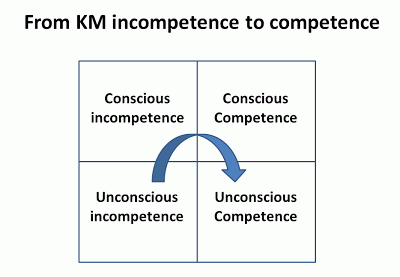It's not about Technology, but about a Culture Change - But which one is driving the other?
In a recent discussion with KM colleagues on KM4Dev whether Facebook could be a useful tool for a professional context, a good friend of mine stated that “we tend focus too much on technology” (even though he happily agrees that he is always fascinated by new technology and trying to find ways to use it, just because he likes it). His view was however that “the primary question is: What is it that we want to achieve and how do we acquire the skills needed to achieve that? Only then the question of the tool arises.”
This made me thinking quite a bit. On one hand I agree that tools should never dominate the discussion about KM, and that they should be seen as a means to an end rather than a purpose in itself. However, I’m also skeptic about the absolutistic dogma that we always have to identify the need first before talking about tools. Yes, in general and from an organizational development point of view I believe this is often true. But at the same time we’re losing sight of the fact that we only realize most of the possible applications of a new technology once it is in place and we start using it. Here an example. When I started my studies in 1994, I didn’t feel any need and didn’t see any value for myself when a friend of mine tried to convince me that I should get an email address. “Why would I need that? Typing a message into a keyboard instead of talking or writing a letter? When I want to communicate with you I just take the phone”. Well, he insisted, I finally signed up for an account with my university – and it changed the way I studied, worked, learned, advocated, networked and maintained relationships for the coming 16 years. And so did it for all of us. It was not me identifying a need and choosing the tool. The sheer existence of tool was reaching out and offering its not-asked-for benefits to me, and it transformed my world, my culture, my life.
We are often stressing (and rightly so) that KM is not at first about process and technology, but most of all about culture change and people, about the way people interact and share. But at the same time we often forget that technological innovation itself is so often the original cause for societal transformation. This is true for the printing press, the steam engine, electricity, the computer, the world wide web. Clearly not all technology is a blessing per se, and I’d rather wish we never discovered nuclear fission, to give just one example. My point is that we cannot look down at technology and reduce it to just its role as tool when useful. Technology is an expression of who we are as human society, so is arts, music, architecture, politics, science and religion. It is changing us as much as we are producing and shaping it. That is why I don’t think one needs to cut back on experimenting with new technology just because we haven't made a business case yet. Because this is who we are, and this is as much part of our mandate as KM pioneers as is the careful evaluation which of tools and methods and processes might be best for a specific business scenario. And if we see that Facebook, Twitter & Co. are changing the social sphere into a more open, sharing, transparent and collaborative environment across institutional and geographic boundaries, we are as KM people (who are spending our time on promoting exactly this) not mistaken if we explore what this approach could do for us in our organizations.
This made me thinking quite a bit. On one hand I agree that tools should never dominate the discussion about KM, and that they should be seen as a means to an end rather than a purpose in itself. However, I’m also skeptic about the absolutistic dogma that we always have to identify the need first before talking about tools. Yes, in general and from an organizational development point of view I believe this is often true. But at the same time we’re losing sight of the fact that we only realize most of the possible applications of a new technology once it is in place and we start using it. Here an example. When I started my studies in 1994, I didn’t feel any need and didn’t see any value for myself when a friend of mine tried to convince me that I should get an email address. “Why would I need that? Typing a message into a keyboard instead of talking or writing a letter? When I want to communicate with you I just take the phone”. Well, he insisted, I finally signed up for an account with my university – and it changed the way I studied, worked, learned, advocated, networked and maintained relationships for the coming 16 years. And so did it for all of us. It was not me identifying a need and choosing the tool. The sheer existence of tool was reaching out and offering its not-asked-for benefits to me, and it transformed my world, my culture, my life.
We are often stressing (and rightly so) that KM is not at first about process and technology, but most of all about culture change and people, about the way people interact and share. But at the same time we often forget that technological innovation itself is so often the original cause for societal transformation. This is true for the printing press, the steam engine, electricity, the computer, the world wide web. Clearly not all technology is a blessing per se, and I’d rather wish we never discovered nuclear fission, to give just one example. My point is that we cannot look down at technology and reduce it to just its role as tool when useful. Technology is an expression of who we are as human society, so is arts, music, architecture, politics, science and religion. It is changing us as much as we are producing and shaping it. That is why I don’t think one needs to cut back on experimenting with new technology just because we haven't made a business case yet. Because this is who we are, and this is as much part of our mandate as KM pioneers as is the careful evaluation which of tools and methods and processes might be best for a specific business scenario. And if we see that Facebook, Twitter & Co. are changing the social sphere into a more open, sharing, transparent and collaborative environment across institutional and geographic boundaries, we are as KM people (who are spending our time on promoting exactly this) not mistaken if we explore what this approach could do for us in our organizations.



Comments